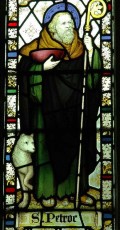Catholic Blesseds, Saints, Solemnities & Holy Days

Saint Petroc
Feast Day: June 4
Patronage: Cornwall
Following the Celtic Christian tradition of seeking education abroad, Petroc traveled to Ireland where he studied in the monastic schools. The Irish experience was formative for many British saints of this period, providing rigorous theological education and ascetic training that would shape their later missionary work.
After completing his studies, Petroc embarked on his mission to Cornwall around the early 6th century. He established his first monastery at what is now Padstow, originally called Lanwethinoc ("church in the wood"). The modern name Padstow derives from "Petroc's Place" (Pedroc-stow), reflecting his lasting association with the settlement.
From this base, Petroc's influence spread throughout Devon and Cornwall. He founded numerous churches and monastic communities, becoming one of the most significant figures in the Christianization of southwestern Britain. His ministry focused particularly on coastal areas, where he established religious foundations that would endure for centuries.
Later in his life, Petroc moved to Bodmin, where he served as the first Prior of the monastery there. When his relics were transferred to Bodmin in the 9th century, it became the primary center of his veneration, eventually growing into one of the wealthiest religious foundations in Cornwall by the 11th century.
St. Petroc's influence extended far beyond Cornwall. Churches dedicated to him can be found throughout Devon, Wales, and Brittany, where his veneration became established by the 10th century. In Wales, his memory is preserved at locations including St. Petroc near Pembroke, Fewig near Cardigan, and Llanbedrog on the Lleyn Peninsula.
He is recognized as one of the three patron saints of Cornwall, alongside St. Piran and St. Michael, and is often called the "Chief of Cornish Saints." His widespread veneration reflects both his historical importance and the enduring power of his religious legacy.
The earliest written life of St. Petroc dates from the 12th century, though it likely preserves much older oral traditions. These sources must be read carefully, as they blend historical facts with legendary elements typical of medieval hagiography.
St. Petroc died in Trereval around 594 CE, likely en route to Padstow during his later years of ministry. His relics remained at Bodmin until the English Reformation, when they were dispersed, though the beautiful medieval ivory casket that once contained them survives and is displayed at St. Petroc's Church in Bodmin.





